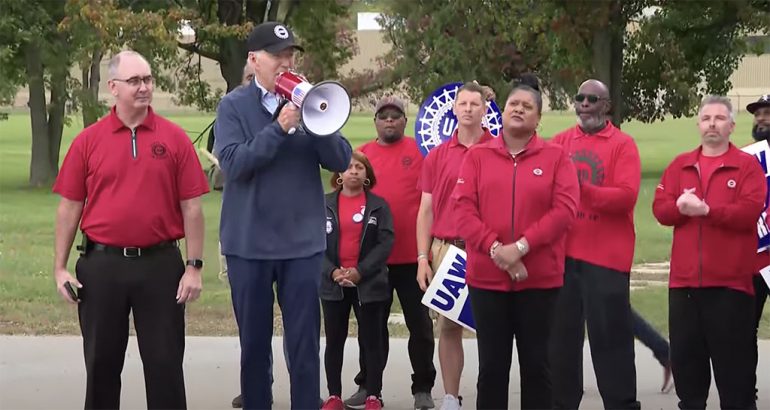
In a historic move, President Joe Biden made a significant visit to striking autoworkers in Michigan, where they were demanding a substantial 40% pay raise. This unprecedented event marked the first time in modern history that a U.S. president had joined workers on a picket line, underscoring the crucial role that union support would play in the upcoming 2024 presidential election.
On this occasion, President Biden arrived at a General Motors parts distribution center in Belleville, Michigan, to stand in solidarity with dozens of striking autoworkers. He addressed the crowd through a bullhorn, highlighting the remarkable turnaround of American automakers following a 2009 government bailout that included wage cuts. Biden expressed his support for the workers, stating, “Companies were in trouble, now they’re doing incredibly well. And guess what? You should be doing incredibly well, too. Stick with it.” He acknowledged the workers’ rightful claim, declaring, “You deserve what you’ve earned. And you’ve earned a helluva lot more than what you’re getting paid now,” when asked if he supported the 40% pay increase.
The atmosphere was electric as President Biden interacted with the crowd, exchanging fist bumps and taking selfies, all while the upbeat notes of John Mellencamp’s “Small Town” played in the background.
The timing of Biden’s visit was notable, coming a day before Republican front-runner Donald Trump was set to address auto workers in Michigan. This back-to-back engagement underlined the significance of courting union support in the upcoming presidential election, despite unions representing a relatively small fraction of the U.S. workforce.
Trump’s impending visit aimed to capitalize on concerns within the auto industry about Biden’s efforts to electrify America’s vehicle fleet, which involved substantial tax rebates for electric vehicle (EV) manufacturing. Republicans argued that this push was unpopular among auto workers and could jeopardize their jobs. Trump accused Biden of betraying autoworkers, claiming that his EV mandate would “annihilate” the U.S. auto industry.
UAW President Shawn Fain, who greeted President Biden at the airport and presented him with a UAW baseball cap, praised Biden’s visit as a “historic moment in time.” Fain criticized CEOs for reaping profits while leaving workers to “fight for scraps.” He expressed gratitude to President Biden for standing with the working class.
The UAW also encouraged non-UAW workers to join local picket lines in support of the “historic” presidential visit. However, they distanced themselves from Trump’s visit, with Fain not planning to attend the event.
The UAW’s decision not to endorse either presidential candidate thus far left a significant question mark over their 2024 preferences. However, President Biden remained unperturbed, stating that he was not concerned about earning the union’s endorsement at this stage of the race.
The strike action initiated by UAW workers targeted major automakers like GM, Ford, and Stellantis (Chrysler’s parent company). Their demands included wage increases commensurate with CEO pay hikes, shorter workweeks, and job security, particularly as the industry transitioned toward electric vehicles.
At the heart of the matter were critical federal policy decisions that both the Detroit Three automakers and the UAW had a stake in. Automakers depended on Washington for subsidies to support electric vehicle production, while the Biden administration and the industry engaged in negotiations over stringent future emissions rules favoring a rapid shift to EVs. The union, however, worried that this transition could result in job losses due to reduced parts demand in EV production.
Although unions represented only 10.1% of U.S. workers in 2022, they wielded outsized political influence, given their strong presence in pivotal swing states that often determined the electoral outcome. These unions boasted powerful grassroots networks that significantly influenced working-class voting patterns.
Michigan, a key battleground state in past elections, remained at the center of political maneuvering. In 2016, Trump secured an unprecedented level of support from union members, helping him win crucial states such as Michigan. However, Biden managed to regain union support in 2020, securing victories in Rust Belt states scarred by decades of job losses.
Trump, during his visit to Michigan, aimed to critique Biden’s economic policies and his push for electric vehicles, presenting himself as a better protector of blue-collar workers. He sought to drive a wedge between union members and their leaders, who had criticized his labor policies during his term.
Democratic strategist Karen Finney emphasized the significance of Biden’s visit, stating that it was vital to ensure Trump did not distort the narrative. She underscored Biden’s commitment to addressing workers directly, preventing any attempts to rewrite history.
In historical context, President Biden’s visit to striking workers in Michigan marked a remarkable show of support for labor rights, reminiscent of Theodore Roosevelt’s invitation to striking coal workers to the White House in 1902. This moment served as a testament to the enduring importance of workers’ rights and their influence on the American political landscape.
Source: Reuters

Lloyd Tobias is a seasoned automotive journalist and passionate enthusiast with over 15 years of experience immersed in the world of cars. Whether it’s exploring the latest advancements in automotive technology or keeping a close pulse on breaking industry news, Lloyd brings a sharp perspective and a deep appreciation for all things automotive. His writing blends technical insight with real-world enthusiasm, making his contributions both informative and engaging for readers who share his love for the drive. When he’s not behind the keyboard or under the hood, Lloyd enjoys test driving the newest models and staying ahead of the curve in an ever-evolving automotive landscape.